UK General Election Results (2024)
Hi Everyone,

The UK General Election was held on the 4th of July. As expected, the Labour Party won easily. They captured almost two-thirds of the seats (412 out of 650). When voting closed at 10 p.m., an exit poll was released. An exit poll is a survey of voters who have just left the polling stations. It is used as an early forecast of the results of the election. Historically, these polls have been very accurate. Compare Figure 1, the exit poll, with the results in Figure 2.
Figure 1: UK General Election Exit Poll
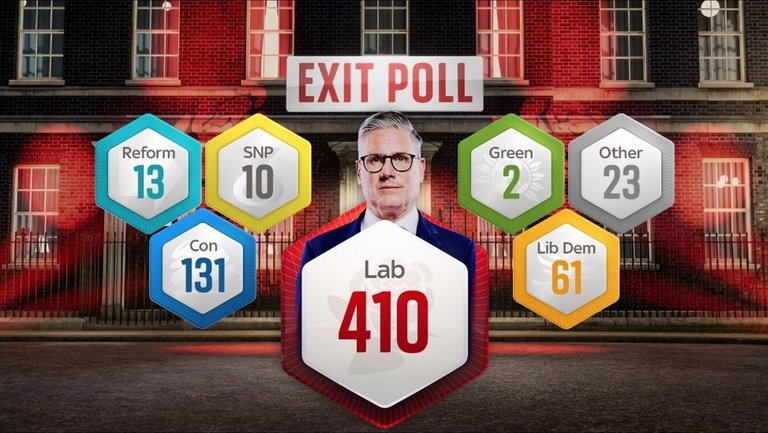
Source: Sky News
Figure 2: UK General Election Result
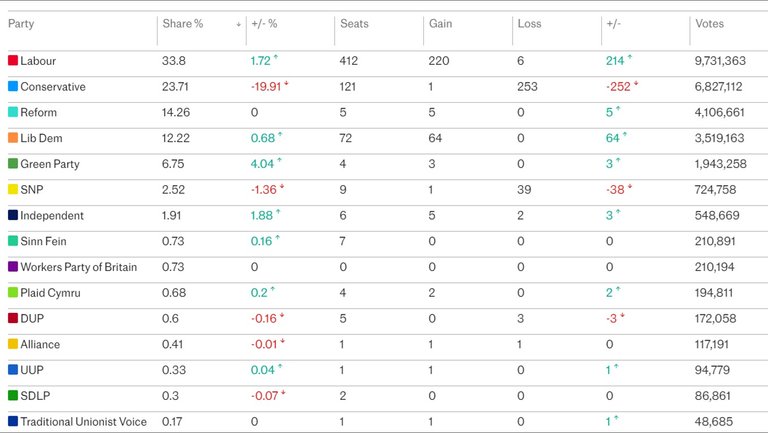
Source: Telegraph
The exit poll was very accurate for the bigger parties. For example, the number of seats predicted for the Labour Party to win was only off by two. It was less accurate for the smaller parties. For example, it predicted Reform UK to obtain 13 seats, but they only obtained 5, and it predicted the Greens to obtain 2 seats, but they managed 4. The main purpose of the exit poll is to accurately predict the winner. Votes are counted quickly in the UK. We normally know the winner the next morning.
The win was only impressive in terms of seats. In terms of the vote share of all registered voters, this was one of Labour’s worst performances. Only 1 in 3 people, who voted, voted for labour. Only 1 in 5 eligible voters, voted for Labour. Figures 3 and 4 compare the results of general elections for the Labour and Conservative Parties since World War 2.
Figure 3: General Election Results Vote Share (1983 to 2024)
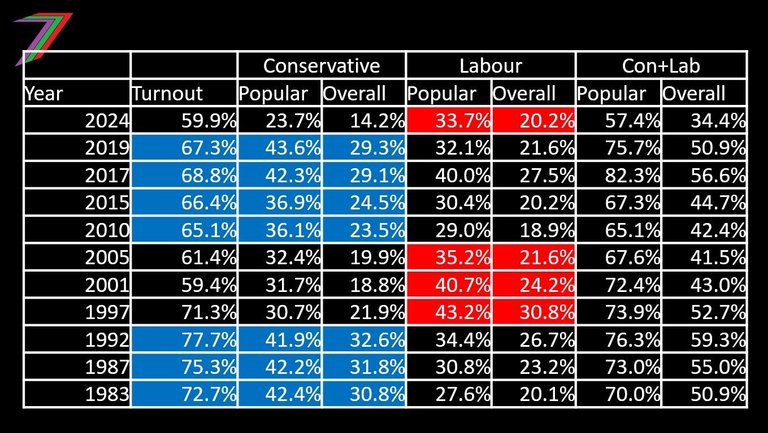
Figure 4: General Election Results Vote Share (1945 to 1979)
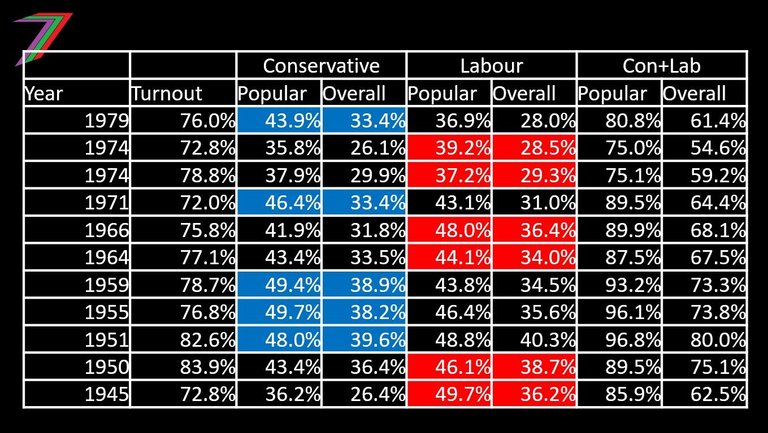
Source: Wikipedia
Note 1: Conservative Party wins highlighted in blue and Labour Party wins highlighted in red.
Note 2: Scroll back the pages on Wikipedia to see earlier election results.
My key observations from these results are as follows:
- The turnout for the election was one of the lowest in UK history; only 2001 was slightly worse.
- Over the past four decades, voter turnout when Labour wins (63%) is considerably lower than when Conservatives win (70%). It appears the Conservative Party base is more likely to show their discontent by not voting than by switching to vote for Labour.
- The Labour Party had the lowest vote share of any winning party in UK electoral history.
- The Labour Party had one of the lowest vote shares in its party’s history.
- The Conservative Party had the lowest vote share in its party’s history.
- For the first time in history, the combined vote share for the Conservative and Labour Parties was less than 60%.
- For the first time in history, the combined vote share for the Conservative and Labour Parties was less than 35% of all eligible voters.
- The complete collapse of the Conservative Party's vote share is the only reason the Labour Party won by a huge majority.
Unpopular New Prime Minister
The Labour Party is unpopular, but their leader is even more unpopular. According to YouGov, Prime Minister Keir Starmer is the 13th most popular Labour politician (YouGov). This is bad considering that he is the leader of the party. He is even less popular than the cake eating, former Prime Minister, Boris Johnson (YouGov). See Keir Starmer's popularity in Figure 5.
Figure 5: Keir Starmer's Popularity
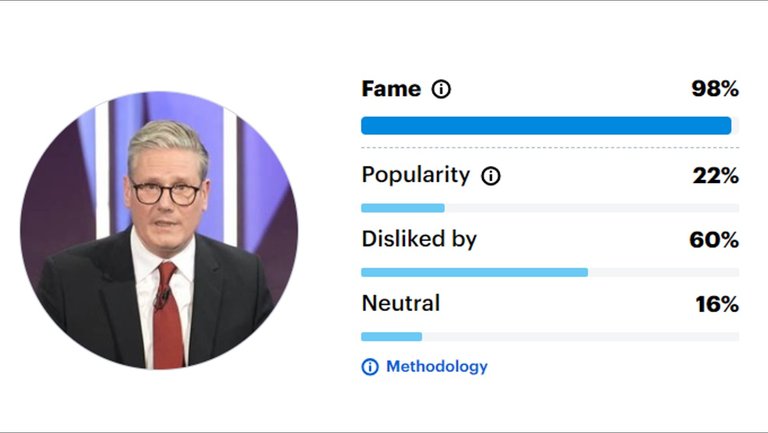
Source: YouGov accessed 08/07/2024
YouGov breaks down people’s opinions of Keir Starmer in a number of different areas. He is perceived unfavourably in almost every aspect. Less than ten percent of the Labour Party voters, think he will be a great Prime Minister. Six times as many people surveyed believe he is more likely to be a terrible Prime Minister than a great one. See Figure 6 for a breakdown of his current popularity.
Figure 6: People’s Opinions of the New UK Prime Minister, Keir Starmer
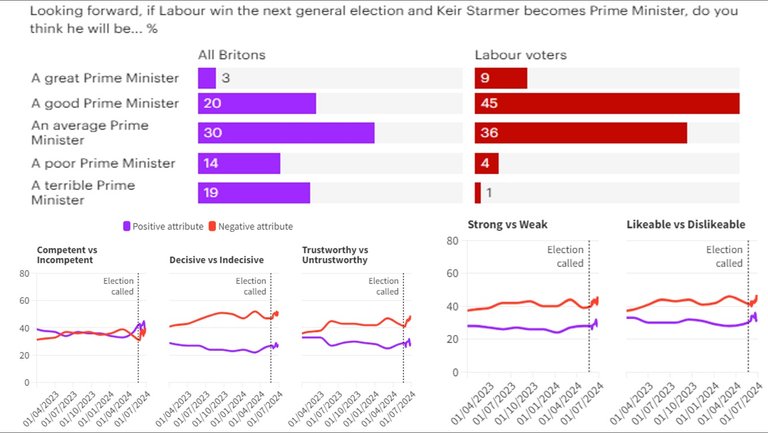
Source: YouGov accessed 08/07/2024
Unpopular leaders rarely last long. An unpopular leader pulls the popularity of the party down. Labour won because most people believed there were no other viable options. When this opinion changes, he is likely to be disposed of.
Good or Bad Result
The Labour Party has won a huge majority of the seats. The new government should be able to do as they please with minimal resistance. Opposition from other parties will be weak in numbers. However, the voices from the new Reform UK Party are likely to be strong. The leader of the Workers Party of Britain, George Galloway, lost his seat. He would have been a powerful voice against the new government. There could be division within the Labour Party itself. However, I think that will be far less of a problem than what the Conservative Party has experienced over the past decade. There is no problem with them being openly pro-establishment.
The next couple of years will be very bad for the UK. The Establishment will be able to fast-track their agenda. We can expect more wokery, continued mass migration, continued transfer of wealth to the richest, continued decline in healthcare, continued loss of personal freedoms, closer ties with the failing EU, more foreign intervention, and much more.
People will become very angry, very quickly. This will lead to increased civil unrest. The discontented people will most likely gravitate towards Nigel Farage and the Reform UK Party. Nigel Farage will become the face of the controlled opposition. He will oppose the visibly and obviously ridiculous agendas that the Labour Party will promote. For doing so, he will be blatantly villainised by the mainstream media. This will substantially increase his popularity, as it will be obvious he is being villainised. Such villainising is already taking place. This was seen with an obviously biased audience during BBC question time (GB News) and with an actor posing as a Reform canvasser who was secretly filmed by Channel 4 (GB News).
The key to stopping real opposition is to ensure it recieves no attention. The mainstream media will ensure no coverage is given. Social media will use shadow banning and their algorithms to ensure minimal visibility. If real opposition has managed to obtain some visibility, this visibility will be drowned out as much as possible. This will also be combined with smear campaigns, but these smear campaigns will be far less blatant and far less obvious than the ones used against the controlled opposition.
A recent example is the former Conservative Member of Parliament, Andrew Bridgen. Once he spoke out against his party and the Establishment, he became blacklisted. He was supposedly removed from the party because of anti-Semitic comments and breach of lobbying rules (The Standard). This only occurred once he began highlighting the harm caused by the fake Covid-19 ‘vaccines’. Once removed from the party, he was treated as if he were invisible.
Important debates around excess deaths were deliberately pushed back, put on Friday’s, and woefully attended by other members of Parliament, who were instructed not to attend by party leaders. It was clear that almost all MPs care more about following party orders than the hundreds of thousands of reported excess deaths over the past two years.
Sadly, Andrew Bridgen lost his seat in North West Leicestershire during the General Election. He had won the previous four elections in that constituency by a relatively large margin. In this election, his vote completely collapsed. See Table 1 below.
Table 1: Andrew Bridgen’s Performance in Elections in North West Leicestershire
| Year | Votes | Share |
|---|---|---|
| 2024 | 1,568 | 3.2% |
| 2019 | 33,811 | 62.8% |
| 2017 | 31,153 | 58.2% |
| 2015 | 25,505 | 49.5% |
| 2010 | 23,147 | 44.6% |
Source: Wikipedia
This election results are a strong indication of what happens when someone stands against the Establishment. It is also an indication of how asleep the public remains. It certainly feels like we might be all doomed.
Was Andrew Bridgen real opposition or just a litmus test for dealing with real opposition? We will probably never know for sure. I like to believe he was genuine.
Opportunities Arise
The problems with the first-past-the-post system have been clearly highlighted. This creates a huge opportunity for change. Change can be good or bad. If it improves the system for us, it is good; for example, better representation of the people. If it improves the system for the Establishment, it is bad; for example, increased control for the few.
The weaknesses of first-past-the-post have been highlighted before. Prior to the 1970s, the first-past-the-post system would have seemed the most appropriate to most. With two very dominant major parties, preferential voting would not have made a difference, but would require extra effort. Proportional representation would have made the tiny third party the power broker between the two major parties, thus not favourable. However, it would have still served the purpose of maintaining the two party system, but it would not have appeared to be a problem.
In the 1983 and 1987 general elections, there was a huge disparity between the number of votes and the number of seats won. The Conservative and Labour parties obtained a proportionally high number of seats per number of votes, when compared to the Alliance (Liberal and SDP) Party (an iteration of the current Liberal Democratic Party). See Figure 7 below.
Figure 7: Results of the 1983 and 1987 UK General Elections
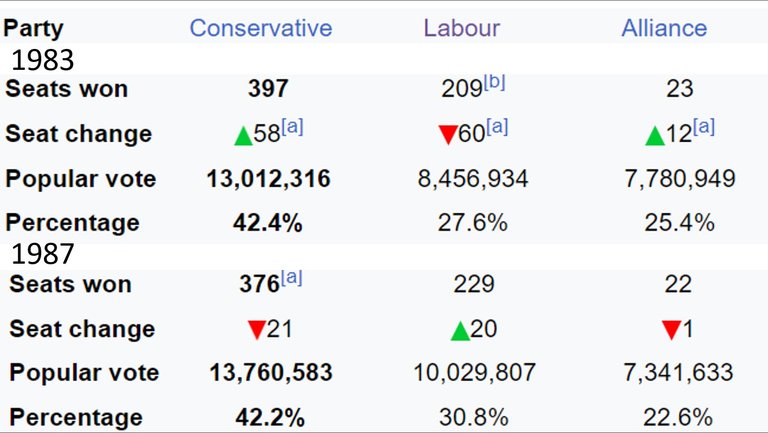
Source: Wikipedia
The Labour Party obtained ten times as many seats as the Alliance Party with only 8% more votes (2.2 percentage points). Under first-past-the-post, the Conservative Party won a clear majority. If the voting system had been proportional representation, the government would have been a Labour/Alliance coalition. If the voting system had been a Condorcet preferential one, it is possible any of the three parties could have formed a government. The unknown second preference would have been the determining factor. The system did not change because the two main parties benefited too much from it.
A couple of decades later, in 2011, there was a referendum on the voting system. This followed the 2010 general election where the Liberal Democrats received a disproportionately low share of the seats given the number of votes they received. See Figure 8 below.
Figure 8: Result of the 2010 UK General Election
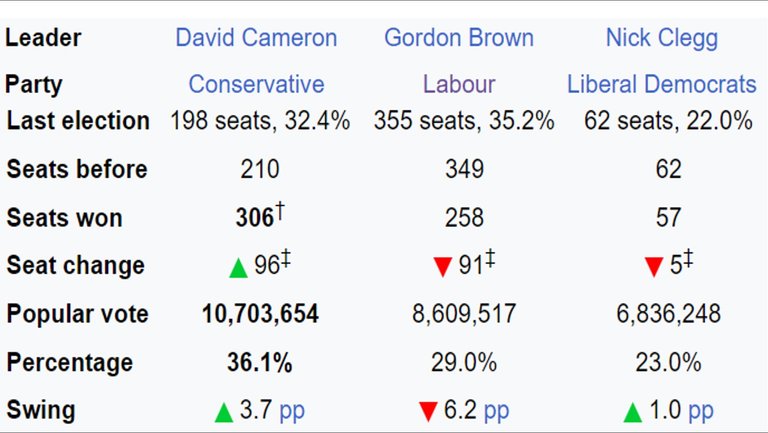
Source: Wikipedia
The vote involved choosing between instant-runoff and first-past-the-post voting systems. Instant-runoff voting involves sequentially eliminating the candidate with the lowest number of votes. This continues until one candidate achieves more than 50% of the vote with the addition of the second, third, or even fourth ranked options from people who voted in favour of eliminated candidates. I discuss instant-runoff and several other voting systems in my post First-Past-The-Post Vs Preferential Voting Systems.
The first-past-the-post voting system won easily with about two thirds of the vote. The overall desire for change was minimal. The turnout for the referendum was less than 50% (Wikipedia). A referendum on two options was a bad approach. Instant-runoff voting is not a particularly good system. It is used in Australia; the outcome of elections would not have been different under first-past-the-post. Third parties are still suppressed. The referendum should have been purely about first-past-the-post. If first-past-the-post had been rejected, there should have been a second referendum, which would have presented several of the most popular alternative voting systems.
This time around, a referendum on the voting system is likely to produce a different outcome. A poll conducted by GB News indicated that 92% of their viewers believe first-past-the-post should be scrapped.
In recent elections, the first-past-the-post has consistently given the Conservative Party the advantage over the Labour Party. The Liberal Democrats, Greens, and Scottish National Party have consistently taken more votes away from the Labour Party than the Conservative Party. This has led to the rise in tactical voting, which has, to an extent, mitigated some of the Conservative Party’s advantage.
The collapse of the Conservative Party has led to the rise of the Reform UK Party. They might become a permanent drain on the Conservatives votes and seats, or they could become their replacement. I believe Reform UK is the ‘right-wing’ element the Establishment needs in the system to maintain the illusion of choice. The first-past-the-post system becomes a hindrance to that. Therefore, it is logical that the Establishment will want to change the voting system to proportional representation. This also helps align the system closer to Europe. Proportional representation would be bad for the UK; I will explain this in detail in another post, where I will compare it with first-past-the-post and Condorcet preferential voting systems.
Conclusion

Source: Bing AI Generated Image
I feel the likelihood of change is high. Change always brings risk, both opportunities and threats. It is important to seize the opportunities. There is an opportunity for the UK to have a fairer voting system. One that enables the election of the candidates that the UK citizens in each consistency perceive will most accurately represent them. I see this as a possible first step to completely changing the governance of a country.
Other steps involve replacing the House of Lords with elected independent candidates, replacing parties with independent candidates, changing the government’s and parliament’s roles to those of administration and problem identification instead of decision-making, and decentralising decision-making to those closest and most capable of addressing problems. In my post, What would get me to the ballot box?, I discuss most of the above and why I consider them important.
My New Book, Sapien Loop

I have published an ebook on Amazon; it is titled ‘Sapien Loop: End of an Era’. The book is fiction. I do not normally write fiction. However, I felt it was appropriate considering what is happening in the world today. Freedom is the most important thing we have, but we are gradually losing it. I have covered this in many of my posts.
In the story, most citizens do not understand the concept of freedom because they have never really experienced it. In essence, the story is about an alien world that might represent our not-so-distant future. There are many other elements to the story that are an abstract and exaggerated version of our reality. I believe this book to be an important read, and I believe it has the potential to change the way you think.
Brief Summary of Sapien Lopp

This story is based on the fictional planet Sapia and its sole country, Sapey. Sapey is portrayed as a form of utopia for all its citizens. No poverty. No war. Almost no crime. Opportunities for all.
This was enough for most citizens, but not all. In one of the small regions, some of the citizens had become discontent. They felt something important was missing in their lives. Their discontent did not go unnoticed. Some of the Sapey elite wanted to weaponise this discontent to gain more power. This created more chaos than they anticipated. This led to further widespread social unrest.
On top of the chaos, ambition and greed provoked another enemy. This enemy was on a mission to settle both new and old scores.
If you want to buy a copy of the book, below are links to the relevant Amazon websites for each country it is available in. The book is priced at approximately US$5.08.
- Amazon USA
- Amazon UK
- Amazon Germany
- Amazon France
- Amazon Spain
- Amazon Italy
- Amazon Netherlands
- Amazon Japan
- Amazon Brazil
- Amazon Canada
- Amazon Mexico
- Amazon Australia
- Amazon India
I am also running monthly contests where participants are required to answer questions based on the book. The prize is 30 Hive Power plus upvotes for the first twelve entries. You can recover the cost of the book with just one win.
Hive: Future of Social Media

Spectrumecons on the Hive Blockchain

This post has been manually curated by @steemflow from Indiaunited community. Join us on our Discord Server.
Do you know that you can earn a passive income by delegating to @indiaunited. We share more than 100 % of the curation rewards with the delegators in the form of IUC tokens. HP delegators and IUC token holders also get upto 20% additional vote weight.
Here are some handy links for delegations: 100HP, 250HP, 500HP, 1000HP.
100% of the rewards from this comment goes to the curator for their manual curation efforts. Please encourage the curator @steemflow by upvoting this comment and support the community by voting the posts made by @indiaunited.
We use the PR system in Ireland and we've had the same 2 parties in government since the foundation of the state. Yes, a few independents and smaller parties get seats, but they can do nothing apart from making a few speeches to an empty chamber. I'm with Stalin; It's not the people who vote that count, it's the people who count the votes."
It seems under Labour, there will be no change. They have the same policies as the Conservatives on Ukraine, Israel, Net Zero and immigration for example. I think this meme sums up the situation perfectly
Labour will take the UK in the same direction as the Conservatives, but will do it faster. They don't need to pretend because that's what they have openly said all along. Very dark days ahead.
Ofcourse these are all just your predictions, no matter how vividly horrid they may seem.😂😂
There's still the slight chance that this new disliked Prime Minister has good things in stored for y'all.
I doubt he has any real say in anything that is about to happen. People need to create their own opportunities. At least there is still a chance for that.
Thanks!
You're welcome
I didn't know it was election season for the UK as well. The US elections has taken up most of the media I saw. Seeing people have difficulty with their government and elections really show how it is a worldwide problem, and at this point I don't know what we can do to improve it.
Lots of elections this year and most of them seem very strange. Look what's happening in France.
Who's going to win the election in the US? I'm guessing it'll be Biden's replacement. I thought it was going to be Michelle Obama, that seems less likely now. Maybe it'll be Kamala Harris.
From what I've read it seems Biden is going to continue to run and represent the democrats. There's still a lot of time till their election, so we'll see how it develops.
Biden is getting attacked by the media from all sides. I think it's just a matter of time.
Great analysis!
I don't follow the uk politics so closely but am really curious how it will turn out. Although I think there are definitely some forecasts of you which could become true 😩
It can be a little strange to an outsider. The results of this election is the strangest so far. The pressure for change will be quite strong.
Guess the pressure for strange is reflected in a lot of coutries. In Belgium, it definitely is as well. But politicians won't listen.
We have a principle: Cordon sanitaire. This means that all parties have agreed informally to not form a government with 'Vlaams Belang', the extreme right party. Guess who's the biggest party in Flanders... 🤷